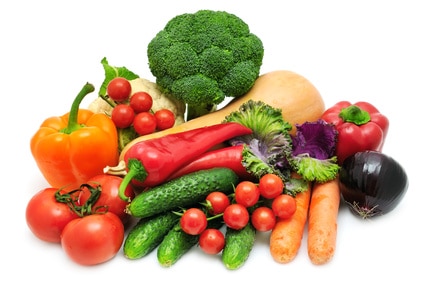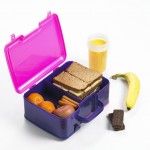 Although you can load up on a year or more of foods for your pantry and save your family an enormous amount of money, the one area you may find yourself still buying on a regular basis is fresh produce. My family and I try to eat a plant-based diet as much as possible ““ but it is clearly the most expensive segment of our grocery budget. These ten tips below will help you with that one stubborn area in your grocery budget that is hard to remove from your regular needs list:
Although you can load up on a year or more of foods for your pantry and save your family an enormous amount of money, the one area you may find yourself still buying on a regular basis is fresh produce. My family and I try to eat a plant-based diet as much as possible ““ but it is clearly the most expensive segment of our grocery budget. These ten tips below will help you with that one stubborn area in your grocery budget that is hard to remove from your regular needs list:
1. Decide what you need to buy fresh and what you can get frozen or canned.If you can load up your freezer with frozen broccoli, you may not need to buy broccoli from the produce department as well. Frozen and canned veggies can be purchased at a FRACTION of the regular cost by using high value coupons with the best frozen goods sales. The belief that fresh produce is always more nutritious is not true – due to what’s involved in early picking and long distance transit involved in stocking fresh produce bins. Frozen and canned can often be picked closer to the peak ripeness time – which is important to maximize vitamins and nutrients. March is generally the best month of the year to load up on frozen foods, however, you can get great deals on frozen veggies throughout the year.
2. Unless you know you are getting a great deal, consider purchasing produce at local vegetable stands or farmers markets. The products can be less expensive and fresher than produce at grocery stores. This is not always the case, however, as I’ve also found the same produce suppliers stocking my local grocery store and the local farmer’s market with the lower price offered at the store.
3. Organic products are becoming more and more popular. However, the lack of pesticides used in the production of the food means that this produce costs more to grow. That cost is passed on to the consumer. As a rule of thumb, produce with thick, inedible skins which protect the fruit generally contain the smallest amount of pesticides. Don’t waste your dollars on the “Environmental Working Group’s Clean 15,” for example. (just google that). Please do your own research, but if you are shopping on a budget, you might strongly consider which organic produce items are not worth the premium cost. Some organic products can be nearly double the cost. The good news is that if you are saving large amounts of money on all your other items thanks to some coupons and smart technology like SavingsAngel.com, you will have much more money to buy the products that matter most to you.
4. This is a simple (and often repeated) bit of advice: make sure your produce is dry when purchasing. There is no need to pay by the ounce for water. Shake that produce off!
5. Unless you are getting a great sale/coupon combination, prepackaged produce (think salad mixes) can cost you much more. Please consider buying whole carrots rather than baby carrots and whole lettuces rather than bagged salads. You will save BIG money this way over the course of a year.
6. Be realistic when purchasing larger quantities of fresh produce. Unless you can jar it, freeze it, or give it away, you will need to eat it before it spoils. Otherwise, you have undone your smart shopping work by having to throw away spoiled food you paid for. That said, keep in mind that you can freeze nearly any vegetable – except lettuce. So, there’s alomst no need to ever throw away produce.
7. Spend some time and read a few articles on the best ways to keep vegetables fresh longer. Some quick tips: Never refrigerate tomatoes, make sure your lettuce is dry (use paper towels), and the green ‘produce saver’ bags are probably not worth your money. Some research and occasional preparation will save you more money.
8. When buying bags of produce, look carefully for any bruised or spoiled items. If you bring home a bag with a spoiled item, remove it when you get home. Remember what they say about one bad apple? It’s true ““ and can end up costing you money. On the other hand, feel free to buy unripened products, split the bunch in half and ripen a portion of your fruit in a brown paper bag.
9. If you can’t grow a full-size garden, consider growing just a few vegetables in pots. You can even grow fruits and vegetables indoors during the winter. With very minimal effort, you’ll get your produce for next to free.
10. Buy your fruits and vegetables when in season and freeze, jar, can, or eat lots of that particular product. A simple Internet search will give you a calendar for your area of when produce items are coming into season. The month previous is generally not the best time to load up on that item!
The best couponers save hundreds of dollars every month at the grocery store. However, couponers can end up living very extreme lifestyles to get those savings. For over five years, SavingsAngel.com has equalized the playing field ““ giving extreme savings to busy families who don’t have the time or ability to be an full-time couponer. Each week, SavingsAngel.com’s team of more than 70 angels combines over 2,000 products on sale at local grocery and drug stores with an enormous database of over 2,000 different manufacturer coupons. These combinations result in our members getting access to over 300 products each week for 50% off or better. Simply log in, choose the deals you want, print or clip only the coupons you need, and save hundreds of dollars a month at regional and national stores. Our angels will personally work with you to craft a plan that will help you buy healthier food at lower prices ““ helping you keep $200 to $400 in savings each month.


